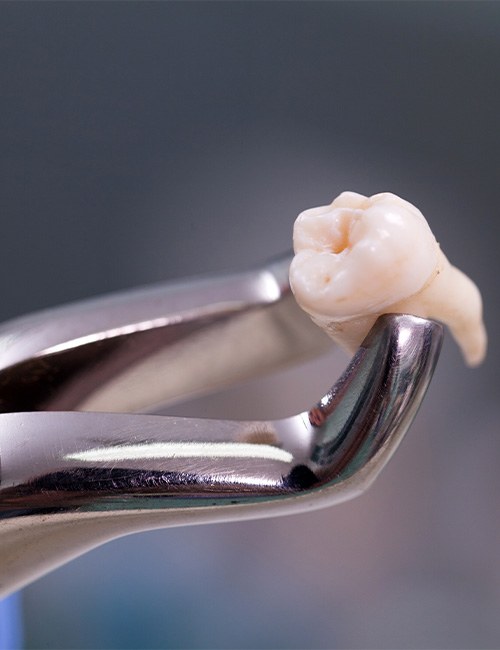
Tooth Extractions – Taylor, TX
Removing Troubled Teeth to Help Your Smile
Here at Taylor Choice Dental, we’re excited to offer tooth extractions under one roof in a comfortable, modern setting. Whether you need a severely compromised tooth removed for the benefit of your oral wellness, or it’s time for your wisdom teeth to go, our team is committed to ensuring a smooth process from start to finish. Continue reading to learn more about tooth extractions in Taylor, along with what you can expect during the process and while you heal up—as always, feel free to contact our team if you have any questions!
Why Choose Taylor Choice Dental for Tooth Extractions?
- Wisdom Tooth Extractions Available
- Same-Day Emergency Appointments
- Dental Insurance Accepted & Financing Options
Reasons Why Tooth Extractions Are Necessary

We’ll only recommend tooth extraction if there is truly no way to salvage the tooth in question or if it threatens the wellness of your surrounding teeth. Sometimes, something like a root canal followed by a dental crown can be enough to salvage a compromised tooth. However, this isn’t always the case. Some situations in which tooth extraction is commonly used to address include:
- Extensive decay or irreparable damage to a tooth
- Advanced gum disease that has caused tissue loss
- A baby tooth hasn’t fallen out on its own
- The wisdom teeth (third molars) have become impacted
- Space needs to be made before orthodontic treatment
The Process of Removing a Tooth

There are two main methods of tooth extraction: simple and surgical. If the tooth in question is above the gumline, simple extraction can often be used. We’ll numb your mouth and gently grasp the tooth with a special pair of forceps before gently rocking it back and forth until it naturally separates from your gum tissue.
For teeth that are still below the gumline, surgical extraction may be needed. This involves making a small incision in the gum tissue to gain access to more of the tooth. From there, it’s usually removed in separate pieces to make things easier. During your appointment, we’ll let you know which form of extraction will be needed for your tooth, and from there, we’ll plan out every detail of your treatment to ensure a smooth recovery.
Tooth Extraction Aftercare

We’ll provide you with a detailed list of post-op instructions, but some basic aftercare tips include the following:
- Take over-the-counter and prescribed pain relievers as directed.
- Get plenty of rest and avoid exercise or strenuous physical activity, since this can increase your blood flow and impact your mouth’s healing.
- Aim to sleep with your head propped up with an extra pillow or two.
- Avoid hard, crunchy, sticky, or spicy foods for several days.
- Likewise, avoid smoking or using tobacco products.
- Drink plenty of water to stay hydrated, but don’t use a drinking straw since the suction can dislodge your blood clot that forms over the surgical site.
You may experience some light bleeding or swelling, as well as some general discomfort, but these symptoms should fade after a day or two.
Understanding the Cost of Tooth Extractions

One of the first questions many patients have when they learn they need a tooth extraction is how much it will cost. However, the final invoice depends significantly on your unique situation.
Our team in Taylor is happy to provide a detailed estimate once you’ve had your initial consultation. Continue reading to learn more about how the price of this procedure is determined and how we help make treatments more affordable!
Factors That Can Affect Tooth Extraction Cost

The amount due for this procedure can vary from person to person because it’s based on your individual circumstances. There are several factors that can potentially impact the total, including:
- The number of teeth being removed. Those having multiple teeth extracted can expect to pay more than someone who only needs one taken out.
- The located of the tooth/teeth. Molars have more roots and are harder to access, and must sometimes be broken into smaller pieces to be safely removed, which can increase the rate.
- The severity of your condition. If you have an impacted or infected tooth, a specialist might be required, raising the rate.
- Replacement options. Restorations like dentures, bridges, and implants all have their own pricing structures.
Does Dental Insurance Cover Tooth Extractions?

Dental insurance can often be a simple and effective way to reduce your out-of-pocket expenses for everything from routine visits to more complex procedures. It’s only natural to wonder whether your policy might also include your tooth extraction.
Fortunately, many plans cover 50% of the cost of major procedures, including extractions, once your deductible has been met. But there may be other restrictions to be aware of, like a waiting period that must pass or a limited number of teeth that can be treated.
If you’re unsure whether your treatment is included or would like help with paperwork or claims applications, please let us know. Our friendly office staff is familiar with the process and can help you maximize your available benefits.
How to Make Tooth Extractions Affordable

We believe that everyone deserves a happy, healthy smile regardless of their financial situation. If you’re uninsured or are concerned that you can’t afford your procedure, you might benefit from one or more of the following payment options:
- We accept Medicaid and CHIP. If your family participates with these programs, they can sometimes be applied to help pay for emergency exams or other expenditures to reduce the out-of-pocket cost for your visit.
- We offer flexible financial options. We’ve also partnered with third-party financers, Sunbit and CareCredit, to offer flexible payment plans. If your application is approved, you can divide your final invoice into more manageable installments that are easier on your wallet.
Tooth Extractions FAQs
Does Getting a Tooth Extracted Hurt?
Many people are hesitant to receive tooth extractions because they are afraid they will hurt, but the process of removing a tooth always begins with our dentist administering an appropriate anesthetic to ensure your comfort. While you can expect to be sore for a while after the procedure, you can minimize this discomfort and your risk of complications by strictly adhering to our aftercare instructions. If your pain seems to be getting worse after several days or if you notice symptoms of infection like fever, fatigue, chills, or a foul taste in your mouth, contact our office in Taylor.
Why Do We Have Wisdom Teeth?
People often take modern food preparation techniques for granted, but the truth is that humans needed the large third molars called wisdom teeth to grind their meals of raw plant and animal matter into easily digestible pulps before cooking was invented. Since then, human jawbones have become smaller on average since they don’t need to work as hard to chew, and many people do not have enough room in their mouths to accommodate their wisdom teeth when they erupt in their late teens or early twenties. The emergence of the wisdom teeth when there isn’t enough space for them can lead to a host of issues like chronic pain, oral infections, crowding, dental misalignments, teeth grinding, and aches of the head, back, or neck. In cases like these, it is often best to painlessly extract the wisdom teeth to protect the patient’s oral health. However, some research suggests that people who eat a tougher diet in early childhood are more likely to develop jawbones with enough room to accommodate their wisdom teeth.
How Do You Make Wisdom Teeth Pain Go Away?
While the only permanent solution to the pain caused by the wisdom teeth is to have them removed by a qualified dentist, there are a few ways to achieve temporary relief until then. A few of these include:
- Wrapping a towel around an ice pack and holding it against the outside of the cheek for twenty minutes at a time. Repeating this every few hours can help reduce pain and swelling.
- Using over-the-counter pain relievers according to the instructions printed on the label.
- Applying a topical oral analgesic that contains benzocaine to sooth irritated gum tissue.
- Rinsing your mouth with a solution of a quarter teaspoon of salt per eight ounces of warm water to reduce swelling and kill harmful bacteria. Be sure to spit it out instead of swallowing and to repeat as needed throughout the day.
How Long Does Wisdom Tooth Surgery Take?
It usually takes between fifteen and twenty minutes to remove a single wisdom tooth, and removing all four can take up to ninety minutes. However, the time it takes to remove a wisdom tooth can vary depending on how it is angled, how deep it is in the gum tissue, and whether it is impacted. The dental team at Taylor Choice Dental will be happy to provide you with a proper estimate of how long your treatment will take during your consultation.